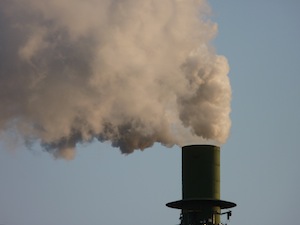A national perspective on the cap & trade program that starts next month

For three years we’ve been watching the process leading up to implementation of California’s plan to push greenhouse gas emissions back to 1990 levels by 2020. As the green flag is about to drop, you’ll start to see more national media attention focused on it.
To wit, this morning’s debut of a two-part series by NPR’s Christopher Joyce on what will be the nation’s first industry-wide cap on carbon emissions.
Joyce describes the program, authorized by the 2006 Global Warming Solutions Act, a “radical experiment” and “a risky step at a time when the state’s economy is shaky.”
The story starts by airing out fears that the program will drive jobs from the state, an effect delicately described by economists as “leakage.” Then Joyce seeks to balance the ledger with prospects for new jobs and industries that the regulations are already spawning.
Joyce profiles two businesses that stand to benefit from the new rules, Propel Fuels of Redwood City and a Washington state-based appliance recycler with a facility in the Bay Area.
Technically the program goes into effect in January but regulators have floated full “compliance” to 2013.
5 thoughts on “California’s “Radical Experiment” in Carbon Trading”
Comments are closed.

“Radical Experiment”? We have been conducting a radical experiment in global geoengineering of our climate during the last 100 years, pumping more and more greenhouse gasses into the atmosphere trying to find the point just before we cross a tipping point and it all turns deadly. I guess there are some who do not think that we have enough data.
Even medical tests are stopped when the results become conclusive. If the drug works, use it. If it does not work, stop the test. Yet, there are those who continue to call for more tests, hoping against hope that they find it all to be benign. Unfortunately, this is like a deadly cancer that kills slowly.
I won’t be here to see the final results. Even another 20 years would be a stretch for me. But we all have children and they have children and we own them a livable world.
Read what NYU Professor Jay Rosen thinks of NPR and their ability to deliver news without false equvalencies. http://pressthink.org/2011/10/nprs-solution-to-getting-bullied-on-the-playground-is-to-bring-more-lunch-money/
Wes Rolley – Green Party CA
Puh-leeze! This is California. “Radical Experiment” is practically the state motto. We’ll figure it all out for the rest of you and you can follow in our footsteps…again.
Leakage is proven, net jobs are a loss due to lost productivity resulting in higher unemployment AND state budget deficit. Our experiment is a huge failure…all for MAYBE 0.05 degree fifty years out?
Tules may very well suppress carbon, but the evapo-transpiration of Tules is almost double that of agricultural crops at a time when when the Department of Water Resources is trying to curb agricultural water use. Does the right hand know what the left hand is doing?
For other readers, I think Hatr1ck is referring here to an idea put forth in Part 2 of the Joyce series, which aired this morning on Morning Edition.